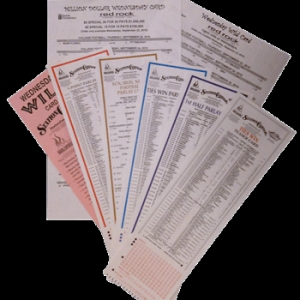Positive odds show how big your winnings are if you bet 100 units. Relationship between Percentage Chance, Decimal, Fractional and US Odds The tool 'What are the Odds' below shows you how percentage chance, decimal odds, fractional odds and US odds are expressed to mean the same thing! Do You Understand Betting Odds Now? Welcome to the Sports Betting Odds section of The Sports Geek. If you are new to sports betting and don’t understand how to read betting odds (+150, -110, +2200, etc) we will lay it all out for you and help you learn how the betting odds work. Some of these places include Wizard of Odds, Casino Center, and Casino Gambling News. Asked in Word and Phrase Origins What does puts them at odds mean - what is the origin of the phrase?
To properly understand sports betting, you need to understand
odds. They are an integral part of any sports wager, and they are used
to determine whether a wager is worth making or not. The
potential payout of any wager you place is calculated using a
combination of the relevant odds and your stake.
On this page, we explain about odds in some detail. We define
exactly what they are and the role they play. We also look at
the three different formats in which they can be expressed, and
explain why odds on the same outcome can vary with different
bookmakers.
What Are Odds?
In sports betting terms, odds basically serve two purposes.
First, they are used to calculate the payouts of winning wagers.
Every time you place a bet with a bookmaker, you’ll be offered
odds at the time, which impact how much you can win. The higher
they are, the more you stand to win relative to your stake.
Second, odds also reflect the likelihood of any particular
outcome happening. The more likely an outcome, the lower they
will be. This makes perfect sense, as you would expect to win
less when betting on an outcome that’s likely than when betting
on an outcome that is unlikely.
Imagine a tennis match where the player ranked number one in
the world is pitted against the player ranked 137th. It stands
to reason that the best player in the world is going to be
considered more likely to win than his opponent. Therefore, a
wager on his winning would have very low odds; a wager on his
opponent winning would have much higher odds.
This is a somewhat simplified explanation, but it gives a
general idea of the role of odds in sports betting.
Different Odds Formats
As you can see, the fundamental principle behind odds is
really quite straightforward. Things are slightly complicated by
the fact that there are three different formats of odds as
follows:
- Moneyline/American Odds
- Decimal Odds
- Fractional Odds
Chances are, at some point, you’ll encounter each of these
formats. For this reason, it pays to be familiar with each one.
They all work in essentially the same way–basically just
different ways of expressing the actual odds for any particular
wager.
Moneyline or American Odds
Moneyline odds are also known as American odds, and this is
the format most commonly used in the United States. They can be
displayed as either a positive or a negative number. A positive
number expresses how much a correct wager of $100 would win,
while a negative number expresses how much you would need to
stake in order to win $100.
If you saw odds of +150, you would know that a $100 bet could
return $150 in winnings, plus the initial stake of $100. If you
saw -150, you would know you need to stake $150 to return $100
in winnings, plus the initial stake of $150. An even money wager
(where you stand to win an amount equal to your stake) is
expressed as +100.
What Does Odds Mean In Gambling
Decimal Odds
Decimal odds used to be associated mostly with mainland
Europe, Canada, and Australia. However, they have now largely
become the standard at most online bookmakers with the exception
of some US betting sites. This is because they are the most
straightforward of the three formats and are expressed simply as
a single positive number, typically to two decimal places.
The number shows how much the total payout will be, including
the original stake per unit staked. For example, a winning bet
at 1.5 would return a total of $1.50 for every $1 staked. A
winning bet at 2.25 would return a total of $2.25 for every $1
staked. An even money bet is expressed as 2.00.
Fractional Odds
Fractional odds are the traditional format used in the United
Kingdom, although decimal odds are slowly taking over.
Calculating potential profits and payouts with this format can
be a little tricky, certainly to start with, but the basic
principle isn’t as complicated as it might seem. As with
moneyline odds, fractional odds show how much potential profit
you can make. To calculate the total potential payout, you have
to add your original stake.
As the name suggests, these odds are displayed as a fraction.
A simple example is 3/1, which is said as “three to one”. 5/1 is
said as “five to one”, and so on. With 3/1, you can win three
units for every one unit staked, and with 5/1 you can win five
units for every one unit staked. 1/1 is even money, so you can
win one unit for every unit staked. As you can see, this is
quite straightforward so far.
Things get slightly more complicated, because this format also
includes examples such as 6/4, 11/10, and 5/2. The math involved
is thus not always so simple. With 6/4, you can win six units
for every four units staked, which is equal to 1.5 units per
unit staked. With 11/10, you can win eleven units for every ten
units staked, or 1.1 units per unit staked.
Whenever the first number is larger than the second, this is
said to be “odds against.” These are basically the equivalent of
positive moneyline odds in that the potential profit is greater
than the amount staked. Things get even more complicated as
there are also “odds on” odds. These are the equivalent of
negative moneyline odds in that the potential profit is less
than the amount staked.
An example of odds on is 1/4 is said as “four to one on”. 4/7
is “seven to four on”, and so on. With 1/4, you can win one unit
for every four units staked, and with 4/7 you can win four units
for every seven units staked.
Converting Odds Formats

If you ever want to convert odds from one format to another,
there are some reasonably straightforward calculations you can
do. We can save you the bother, however, as we offer a useful
tool which will automatically convert any odds from one format
to another. You can find this tool on the following page.

Why Odds Vary on the Same Outcome
For a lot of wagers on sporting events, you’ll see that
different bookmakers offer different odds. For example, one
might have a football team at +130 to win a match, while another
might have the same team to win the same match at +120. To
explain this, we expand on a statement made earlier.

When we said that odds reflect the likelihood of a particular
outcome happening, it would have been more accurate to say that
they reflect how likely a particular outcome will happen in the
view of the bookmaker. Predicting how likely any outcome is in a
sporting event isn’t an exact science, and it essentially comes
down to a matter of opinion.
This is why the odds in sports betting are variable, because not
all bookmakers will have exactly the same view on how likely a
particular outcome is. Odds can also be affected by other
factors, such as the amount of money a bookmaker has taken on a
particular market. What this means is that the odds that a
bookmaker sets for a wager aren’t always an accurate reflection
of the true likelihood of the relevant outcome happening.
Therefore, it’s possible to put the odds in your favor when
betting on sports. If you’re able to correctly predict the
outcome of sporting events often enough, you can consistently
turn a profit. It’s not easy, but if you can combine your sports
knowledge with an understanding of certain key aspects of
betting, it can definitely be done.
Odds are one of those key aspects, and you hopefully now
understand how they work and why they vary. You should also
understand why the use of odds is the main reason why bookmakers
make money, which we explain in the next article.
What Does ATS Mean In Sports Betting?
by Doc's Sports - 10/10/2014
The term 'ATS' is an acronym for against the spread. ATS is one of the most commonly used non-words in sports betting. If you are betting ATS then you are making a bet involving a pointspread - as opposed to a moneyline bet, a totals bet, a proposition bet, or another type of exotic bet. You can bet ATS in football or basketball, and that is the most common way to bet. ATS betting is not typically available on baseball or hockey. You can also use ATS in regards to your record in bets against the spread. If your record is 4-2 ATS during a particular week then that means that you have made six bets against the spread and have cashed a winning ticket four times. That doesn’t necessarily reflect your entire betting record for the week if you have also made other types of bets.
What Do Betting Odds Mean
An example, you say? Sure thing. Let’s say that Bob wants to bet the Jaguars ATS. That means that he is saying that the Jaguars will cover the spread in their upcoming game. If Jacksonville is +4.5 in that game then that means that Bob wins ATS if the Jaguars win outright, if they tie, or if they lose by four or fewer points. If the spread were +4 instead of +4.5 then the scenario would be the same except if Jacksonville lost by exactly four points then the game would be a push, and Bob would get his money back. A push is not reflected in an ATS record - it’s like a non-bet. If Bob were to win his bet then he could say he was 1-0 ATS on the day.
Best Gambling Odds In Vegas
When betting, ATS bettors need to remember one thing above all else - who wins the game only rarely matters. Bettors who fixate on winners and losers are going to go broke betting against the spread - they should stick to the moneyline. All you need to focus on is how much a team can be expected to win or lose by. A team could win every single game they play and not cover a single spread if they were always heavy favorites, and never won by a wide margin. A team could also lose every game, be massive underdogs in the eyes of the public, and keep games close enough to cover every spread. The straight-up record of teams is irrelevant to ATS considerations.
Doc's Sports is offering $60 worth of handicapper picks absolutely free - no obligation, no sales people - you don't even have to enter credit card information. You can use this $60 credit any way you please for any handicapper and any sport on Doc's Sports Advisory Board list of expert sports handicappers. Click here for more details and take advantage of this free $60 picks credit today .